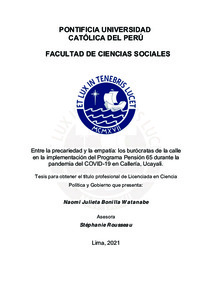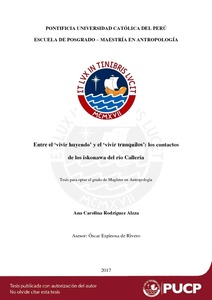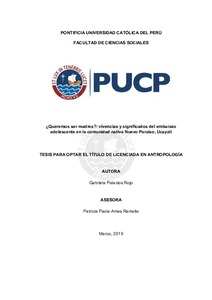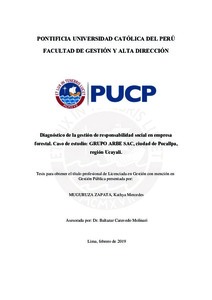| dc.contributor.advisor | Rousseau, Stéphanie | |
| dc.contributor.author | Bonilla Watanabe, Naomi Julieta | |
| dc.date.accessioned | 2022-05-26T18:18:36Z | |
| dc.date.available | 2022-05-26T18:18:36Z | |
| dc.date.created | 2021 | |
| dc.date.issued | 2022-05-26 | |
| dc.identifier.uri | http://hdl.handle.net/20.500.12404/22451 | |
| dc.description.abstract | Pensión 65 es un programa social que busca asegurar el bienestar de
adultos mayores que se encuentran en situación de pobreza extrema a través
de una pensión no contributiva y diversas intervenciones. Esta investigación
estudia la implementación de este programa en el distrito de Callería, Ucayali en
el contexto de la pandemia del Covid-19. Así, la pregunta planteada es, ¿de qué
manera la implementación de Pensión 65 ha sido afectada durante la pandemia
del Covid-19 en el distrito de Callería, Ucayali?
Para ello, se aplicó un diseño observacional de tipo cualitativo con herramientas
de recojo de información que priorizaron el trabajo de campo. Así, se realizaron
entrevistas semi estructuradas y a profundidad, observaciones no participantes
y participantes junto con los burócratas de la calle.
Desde un enfoque retrospectivo sobre la implementación de políticas
públicas y utilizando la teoría sobre los burócratas de la calle, se sostiene que
estos funcionarios utilizan su discrecionalidad en un contexto con dificultades y
retos que aumentaron en el marco de la pandemia. De esta manera, su trabajo
está marcado por la precariedad y por un Estado que los pone en condiciones
limitantes. Frente a ello, usan diversas estrategias discrecionales para lidiar con
sus labores, muchas veces, a costa de su propio bienestar ya que existe una
carga emocional y normativa a partir de sus interacciones con la ciudadanía.
Finalmente, la discrecionalidad y las acciones de los burócratas de la calle es lo
que permite que el programa se implemente durante la emergencia sanitaria. | es_ES |
| dc.description.abstract | Pension 65 is a social program that aims to ensure the well-being of older
adults in highly impoverished conditions through a non-contributory pension and
various interventions. This research focuses on the implementation of this
program in the Callería district, Ucayali, during the Covid-19 pandemic. Thus, the
question that guides the study is how the implementation of the Pension 65
National Solidarity Assistance Program has been affected during the Covid-19
pandemic in the Callería district, Ucayali?
The research applied a qualitative observational design with information
collection tools that prioritized fieldwork and conducted semi-structured in-depth
interviews. Additionally, non-participant and participant observations were made
together with street level bureaucrats, those in charge of implementing the
program directly with citizens and representing the State.
From a retrospective approach to implementing public policies and using the
street level bureaucrat theory, the thesis emphasizes that street bureaucrats use
their discretion in a context of many difficulties and challenges that increased
during the pandemic. Furthermore, the work by these officials is precarious and
governed by a State that puts them in conditions with many limitations. Faced
with this, officials use various discretionary strategies to deal with their work, often
at the cost of their well-being because there is an emotional and normative aspect
to their interactions with citizens. In conclusion, it is argued that the street level
bureaucrats’ discretionary actions allow a smoother implementation of the
program during a public health crisis. | es_ES |
| dc.language.iso | spa | es_ES |
| dc.publisher | Pontificia Universidad Católica del Perú | es_ES |
| dc.rights | info:eu-repo/semantics/closedAccess | es_ES |
| dc.subject | COVID-19 (Enfermedad)--Aspectos económicos--Perú--Callería (Ucayali : Distrito) | es_ES |
| dc.subject | Personas adultas mayores--Perú--Callería (Ucayali : Distrito) | es_ES |
| dc.subject | Pensiones a la vejez--Perú--Callería (Ucayali : Distrito) | es_ES |
| dc.subject | Investigaciones evaluativas (Programas de acción social)--Perú--Callería (Ucayali : Distrito) | es_ES |
| dc.title | Entre la precariedad y la empatía: los burócratas de la calle en la implementación del Programa Pensión 65 durante la pandemia del COVID-19 en Callería, Ucayali | es_ES |
| dc.type | info:eu-repo/semantics/bachelorThesis | es_ES |
| thesis.degree.name | Licenciado en Ciencia Política y Gobierno | es_ES |
| thesis.degree.level | Título Profesional | es_ES |
| thesis.degree.grantor | Pontificia Universidad Catolica del Peru. Facultad de Ciencias Sociales | es_ES |
| thesis.degree.discipline | Ciencia Política y Gobierno | es_ES |
| renati.advisor.dni | 48972614 | |
| renati.advisor.orcid | https://orcid.org/0000-0002-1937-5342 | es_ES |
| renati.author.dni | 71420305 | |
| renati.discipline | 312026 | es_ES |
| renati.juror | Ilizarbe Pizarro, Carmen Margarita | es_ES |
| renati.juror | Rousseau, Stéphanie | es_ES |
| renati.juror | Dosek, Tomas | es_ES |
| renati.level | https://purl.org/pe-repo/renati/level#tituloProfesional | es_ES |
| renati.type | https://purl.org/pe-repo/renati/type#tesis | es_ES |
| dc.publisher.country | PE | es_ES |
| dc.subject.ocde | https://purl.org/pe-repo/ocde/ford#5.06.00 | es_ES |








